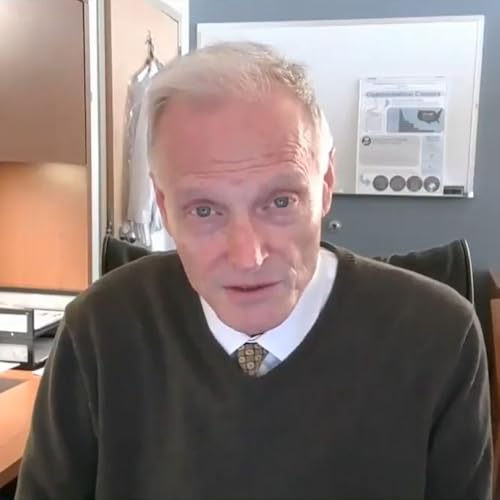“Badge-up” with Dr Marshall at ASCO 2025John Marshall, MD: John Marshall coming to you live Oncology Unscripted, not from my office back in Georgetown, but from beautiful downtown Chicago, Illinois at ASCO 2025. Look at this amazing place. 40,000 of our closest friends.To get in, you need to have one of these. So, I'm gonna go ahead and badge up. I got a fancy red collar thing here, boy, that makes me stand out even that much more.But what we're gonna talk about today first is the social aspect. You remember in anticipation of coming, we were a little worried about would people from outside the US come to the meeting, and, yep, they've come, but not to the same extent that they have in years past. So very clearly international travel being affected by the world today, and, therefore, our community, which is so important to get together on a regular basis, probably being a little bit affected by this. But it is an incredible time to get together, to share thoughts, to give a hug or two, to shake a hand or two, and connect with those of us in our community who are dedicated to trying to cure cancer to find positive outcome for our patients for Monday morning, for Tuesday morning, in the week ahead.So, let's start with some high-level reviews of the most important science. Later today, we will have the plenary session where five abstracts will be presented, each one of which has significant impact on our patients going forward. Let's start, in my world of GI cancer, where immuno-oncology, again, doubling down in the microsatellite unstable patient adjuvant IO in MSI patients with chemotherapy proving to be better than chemotherapy alone. Not tested against IO alone, which will clearly be the next question, but for now, starting next week, MSI-high, IO plus chemotherapy in the adjuvant setting in colon cancer.What about gastric cancer? Same thing, IO, and this is not an MSI-high, added to chemotherapy showing survival benefit for our patients with gastric cancer. So, as of today, new standards where IO will be added to adjuvant perioperative therapy for patients with gastric cancer.And the third area where IO has been shown to be a benefit in this plenary session is adding it to radiation and chemotherapy in head and neck cancer, something we've long been needing. Improved novel therapies for head and neck cancer. IO has just entered that field too in the curative intent combo chemo RT setting. So, three major places where IO is gonna have an impact starting today.Now I'm not even gonna try to talk about polycythemia vera. I'm not even sure I can spell it, so I'm gonna make you look that one up yourself.But I wanna finish from a plenary perspective on this breast cancer study. Of course, it's always breast cancer. They are the smartest, they have the most money, they have the highest survival of all of our solid tumors, and, yep, they did it again. They actually show that if you monitor patients who are getting therapy and you can use circulating tumor DNA, so a blood test that can demonstrate the emergence of resistance before there's a change in the clinical scenario. And if you add in, in this case, an androgen hormone degrader, that in fact you can intervene and actually extend survival and progression-free survival significantly. So, this is real time monitoring, using novel blood tests for resistance and changing your therapy in advance of any other clinical signal. Clearly, this is the way things are gonna be going more and more as we define therapies for our patients. Not so much using CT scans and waiting on progression, but blood tests that demonstrate resistance at a much earlier time point.Two other important GI papers. Not part of the plenary. There wasn't room for everything in the plenary, and this is, guess what? It's now good to be BRAF colon cancer. Do you remember when it used to be bad to be HER2-positive breast cancer? Do you remember when it used to be bad to be MSI-high? Well, it's not bad anymore for those two because the therapies work. It used to be bad to be BRAF V600E-mutated colon cancer. Just a bad prognostic sign. Nothing you can do about it. Study just presented showed that the addition of BRAF-targeted therapies and frontline metastatic colon patients with a 30-month median survival. So, that took a bad marker, we can now deal with it. What does that mean for your clinic? I'm gonna be strong here. It now means that it is malpractice, you are not practicing the standard of care, if you're not doing frontline molecular testing in colorectal cancer. You are obligated to find Ras mutations, BRAF mutations, MSI, and HER2 before you initiate treatment. So, this positive BRAF study affects standard of care in your practice today, so you have to do that going forward.There was a study looking at the novel, local therapy for pancreas cancer called tumor treating fields. That showed some positive data, finally, in pancreas cancer, so that's exciting. Tomorrow morning ...
続きを読む
一部表示
 22 分
22 分 24 分
24 分 33 分
33 分 33 分
33 分 2025/09/1620 分
2025/09/1620 分 38 分
38 分 55 分
55 分 2025/06/1011 分
2025/06/1011 分
